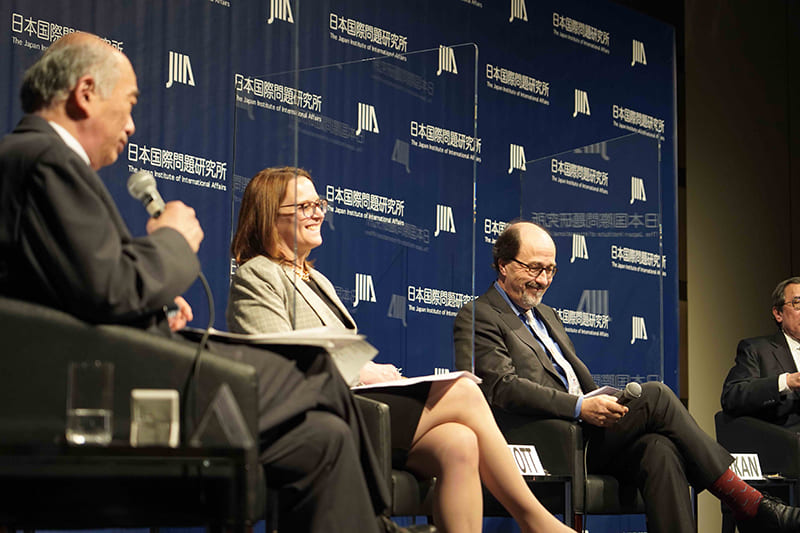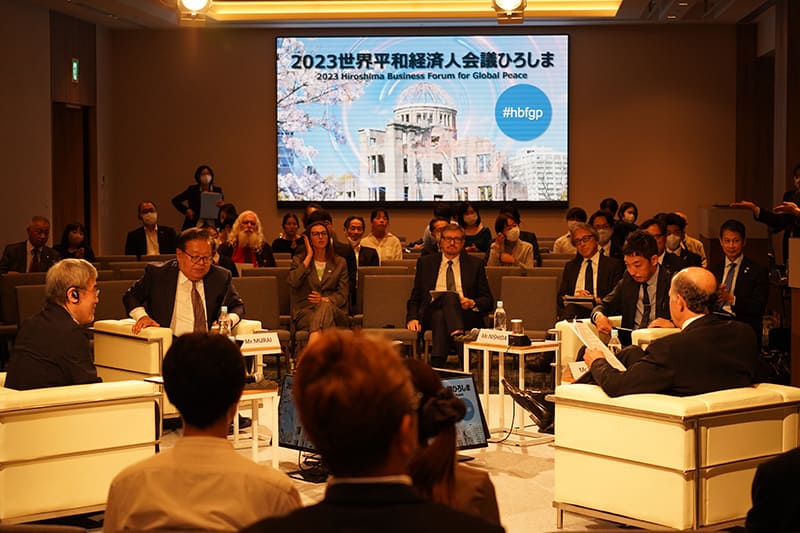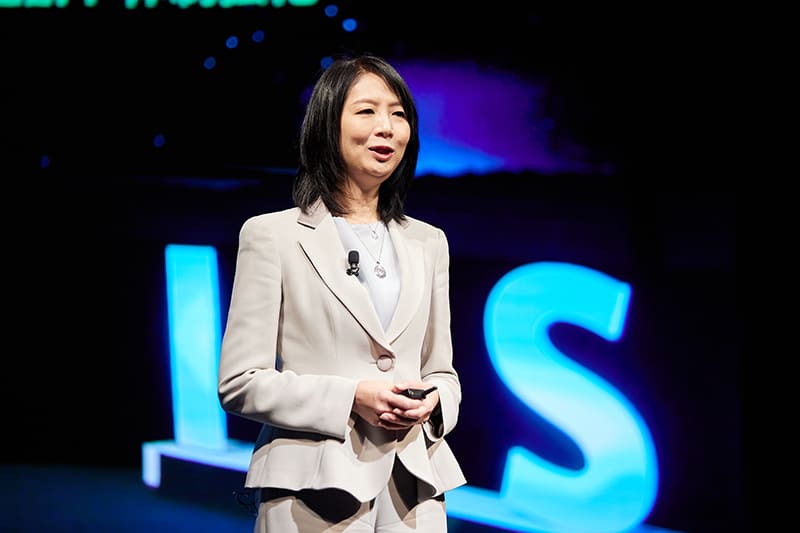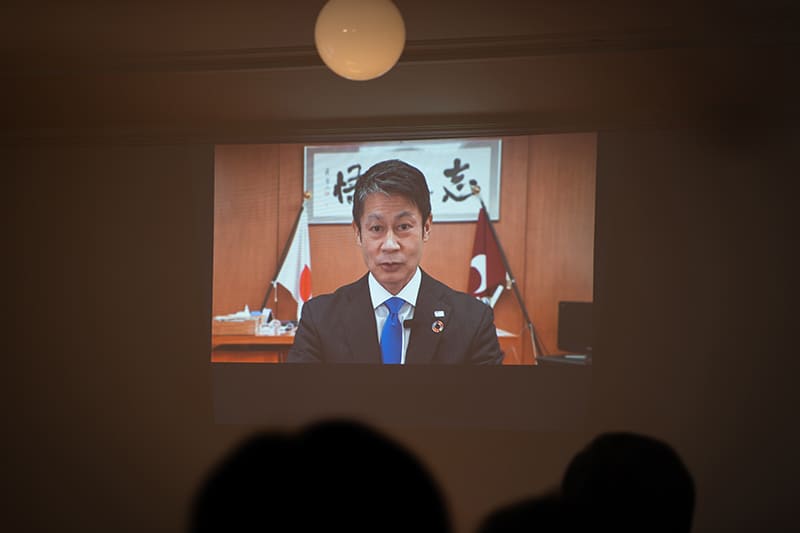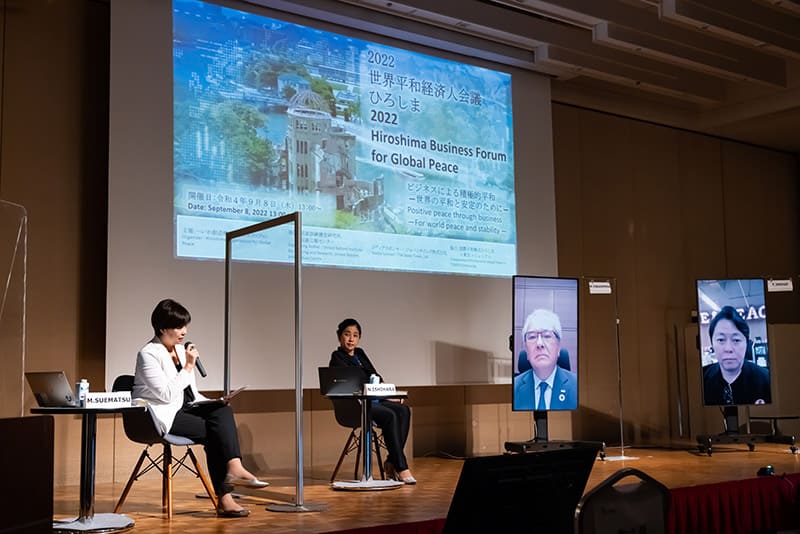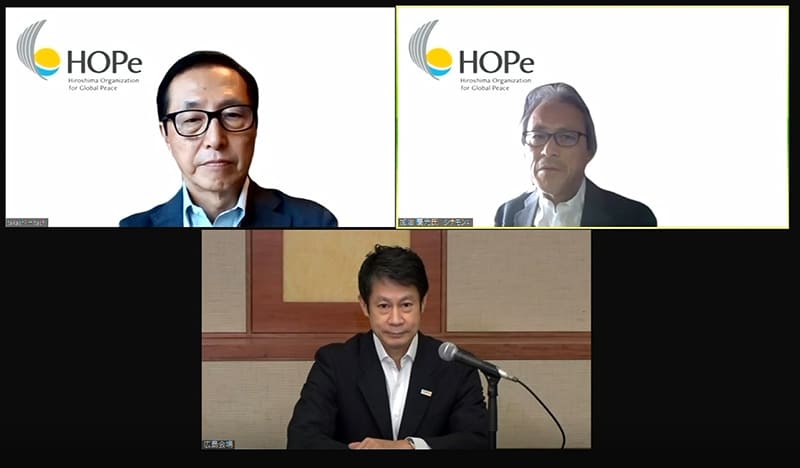March 22, 2024
Tokyo Global Dialogue: Rebuilding security, cooperation
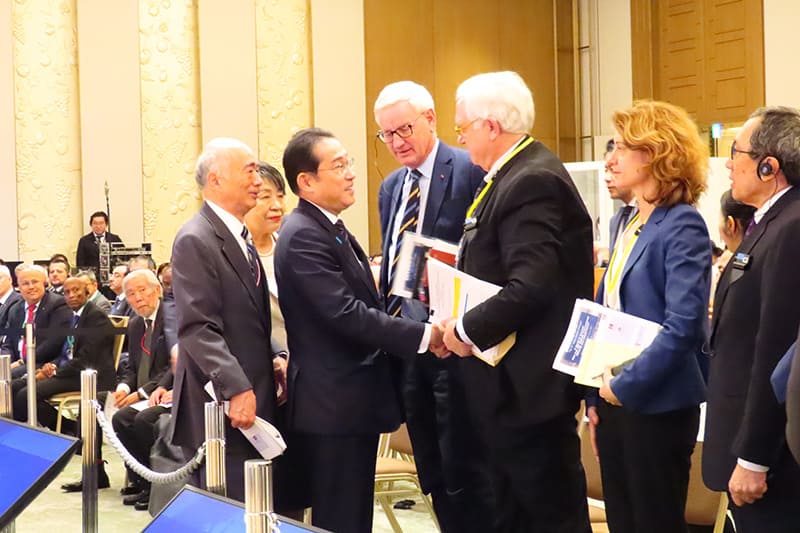
In the midst of upheavals in international politics putting global peace and security at risk, the fifth Tokyo Global Dialogue took place at the Okura Tokyo hotel in Tokyo’s Minato Ward and online on Feb. 28 and 29.
Through in-depth discussions among about 30 speakers from more than 10 countries, it was confirmed that destabilizing factors currently shaking the world — including the war in Ukraine, U.S.-China competition and the crisis in the Middle East — are not merely regional affairs but are issues of grave concern for every country and should be solved through international cooperation and dialogue.
The event was organized by the Japan Institute of International Affairs (JIIA), a private, nonpartisan policy think tank established in 1959 with a special focus on foreign affairs and security issues, and gathered more than 360 participants in person and 800 online.
The event was launched in 2019 to commemorate the 60th anniversary of the JIIA to encourage international dialogue for the sake of global peace and security and to share Japan’s views with the rest of the world. The last three events were held during the coronavirus pandemic. Two years after Russia’s invasion of Ukraine and five months into the war between Hamas and Israel, the JIIA chose as this year’s theme “A World in Turmoil: How Can We Rebuild International Security and Cooperation?”
Facing the ‘three fronts’
In the roundtable held on the first day of the event, six speakers from different countries who have profound insight into international relations sat together and discussed how they see the current state of the world and what should be done in the face of the turmoil, based on the JIIA’s Strategic Annual Report 2023.
The session was moderated by JIIA President Kenichiro Sasae, who has held a number of diplomatic positions, including vice minister for foreign affairs and ambassador to the United States. He began by saying that the Strategic Annual Report 2023 details how the world faces “three fronts” — the war in Ukraine, the Hamas-Israeli war and the China-U.S. competition — plus division in the United States, which will all have an enormous impact on progress in addressing global governance issues such as climate change, economic security and the dysfunction of the United Nations.
In the face of the war in Ukraine, which the report describes as a “tactical stalemate” testing Western unity, Carl Bildt — the vice chairman of Kreab Worldwide and a former prime minister of Sweden, who takes Sweden’s recent accession to NATO as a matter of course — described NATO’s significance as an organization that “creates a strategic depth for the defense.” He added, “Cooperation between NATO as a military alliance and the EU as a security alliance is increasingly important.”
Germany is also enhancing its contributions to NATO. Daniela Schwarzer, who is a member of the executive board of the media giant Bertelsmann as well as an honorary professor of political science at the Free University of Berlin, referred to Germany’s prompt decision to reduce or end imports of Russian fossil fuels after Russia invaded Ukraine. She said Germany will make a major move toward realizing the 2014 commitment agreed upon by NATO’s European members to spend a minimum of 2% of their gross domestic product on defense to ensure the alliance’s military readiness. Referring to the prominent and substantive contribution that Germany has made in providing support to Ukraine, she said there has been a “fundamental evolution” in how Germany thinks about and engages in international relations, which is leading to the view “that Germany needs to take better care of its own security, that it should be less naive in working with states that do not comply to democratic and international law principles and that, finally, it needs to play a stronger role within the EU.”
John J. Hamre, the president, CEO and Langone Chair in American Leadership at the Center for Strategic and International Studies, said the strategic goal that the global community should be embracing is how to defend Europe, which hinges irrevocably on rebuilding Ukraine. The rebuilding can only start after the war ends, and he said there is no way that Ukraine on its own can create a deterrence framework against Russia. The only way to stop the war, he said, is to bring Ukraine into NATO. “The real dilemma is, is there a strategic bargain that can be made to end the war?” he said. He added that some legal process needs to take place to decide the future of Ukraine’s lost territories to start rebuilding the country as soon as possible.
Australian Strategic Policy Institute Executive Director Justin Bassi quoted from a passage in the report saying that the principles of territorial integrity, sovereignty and international order based on international law should not be undermined, and raised doubts about any move to give up territory in exchange for peace. “How can a peace be imposed on Ukraine that allows Russia to take seized Ukraine land? How can any of those three principles of territorial integrity, sovereignty, and international law and rules be ensured if we impose a negotiated peace on Ukraine?” he said. He also stressed that security in Europe is vital not only for Europe but also for the Indo-Pacific region.
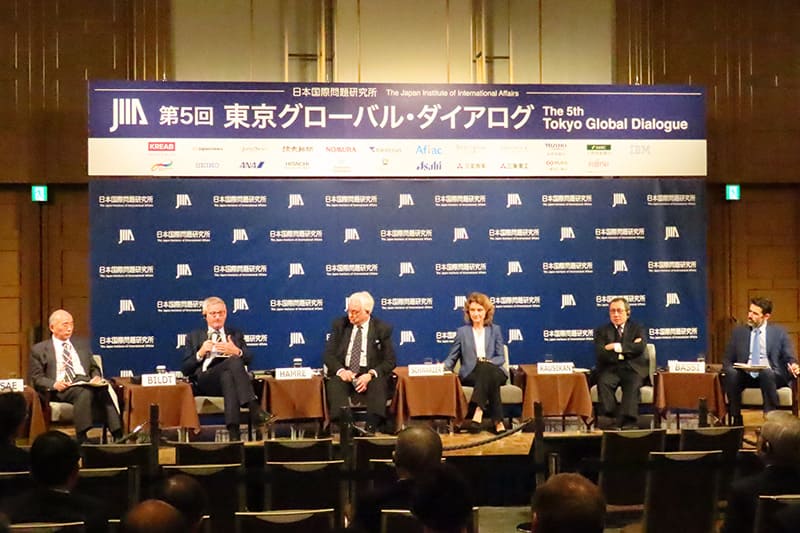
Indo-Pacific, China
On the Indo-Pacific front, a strong U.S. presence has contributed to stability in the area for decades. Bilahari Kausikan, chairman of the Middle East Institute at the National University of Singapore, discussed changes in policies in Southeast Asia, especially in countries with large Muslim populations, in relation to the presence of the U.S. He said Singapore has always thought of the U.S. as a vital, irreplaceable component of strategic balance in the region, unlike Indonesia and Malaysia, which have been bitter — at times almost hysterical — about the U.S. presence and its actions in the region. “Now, in both of these countries, there has been a fundamental change of attitude towards the U.S. in the last 10 or 15 years,” he said, noting that there is now a recognition that anchoring the U.S. in Southeast Asia is good for the region even if people do not openly say that.
On the other hand, there is also the Chinese competition with the U.S. This year’s presidential election in the U.S., which is expected to be a race between President Joe Biden and his predecessor Donald Trump, is likely to affect how the country will deal with China.
Peking University professor Jia Qingguo, who participated in the session online, said the Biden administration’s China policy is more predictable than Trump’s. He pointed out that the current government emphasizes cooperation as well as competition, but when Trump was in office, “the tone was confrontation.” He added: “The relationship between China and the U.S. is a very complicated and complex one, and we believe that there are a lot of areas in which we have shared interests and stakes. We need to cooperate in the interests of both countries and also for the world.”
The China-Taiwan relationship is also a focus of global attention. “From the Chinese perspective, Taiwan is part of China,” Qingguo said, stressing that it is a domestic issue, not an international issue. He added that achieving a positive relationship between China and Taiwan instead of a negative one will provide “a better chance for peaceful management, and eventually peaceful unification between the two sides of the country.”
Bassi from Australia noted that unpredictability can in some ways help things, including in relation to countries like China, which is itself unpredictable. “But of course that unpredictability is not positive when it comes to allies and partners. Allies and partners deserve predictability,” he said, referring mainly to Australia’s allies in the AUKUS, a security partnership for the Indo-Pacific region between Australia, the United Kingdom and the United States that was agreed upon in 2021, and the Quadrilateral Security Dialogue among Australia, India, Japan and the United States. “We’ve all got interests here,” he said. He warned that the issues in the Indo-Pacific region should not be simplified to a competition between China and the U.S. “And it is simply not the case that the only trouble we have is the U.S. looking to contain China’s legitimate rise. That’s a ruse, in fact, and that’s why countries like Australia need to be consistent in terms of how we respond to actions regardless of the countries that carry them out. Where there is a breach of international rules we need to call it out, otherwise we’re at risk.”
The importance of allies
Hamre from the U.S. also touched on the importance of allies. He said the U.S. defense budget is more than enough and the country can spend more if necessary, “but we can’t manage the security of the future without allies.” He pointed out that the country’s challenges will revolve around its domestic political focus, not its capacities. And the challenges derive from what he called “a historical inversion” of the country’s two political parties against their past norms. Referring to the current Republican Party as the party of laborers and farmers, he said the Republicans are indignant over the current state of the world and want to go backward. “The Democratic Party now is the party of professional elites who feel guilty about being rich,” he said. He added that it is no longer the party of opportunity but the party of correcting injustices of the past and regretted that neither of the two parties has an agenda for the future.
Although the discussion was already in full swing, Sasae did not forget to engage the audience. One of the questions from the floor was about a potential international system that can provide better stability and peace. “All of the complex problems in the world are horizontal and all of the governments are vertical,” Hamre said, adding that the role of informal coalitions such as the Group of Seven will grow. “They are not binding, but they are consensus-based organizations that are going to try to help countries make good-faith efforts to coordinate within that framework,” he said.
Bildt argued that the global community needs to preserve and create coalitions far broader than the G7 to address global challenges such as climate change, particularly in an era of increasing rivalry, conflicts and vetoes on the Security Council on one issue after another.
Another question from the audience was about the dysfunction at the U.N., especially the Security Council. Kausikan from Singapore said the Security Council is operating as it was intended to operate, with vetoes serving as a circuit-breakers to prevent the collapse of the Council when the interests of a major power are involved. “It is not very satisfactory because the fundamental assumption of the U.N. was wrong — the fundamental assumption was that the victors of World War II would continue to work together,” he said.
Bildt, who has held several positions at the U.N. and in the EU, agreed with Kausikan about the Security Council but also pointed out that the U.N. is far more than just the council — “It is all those specialized agencies that are more or less functioning and are fairly fundamental to the functioning of the world.”
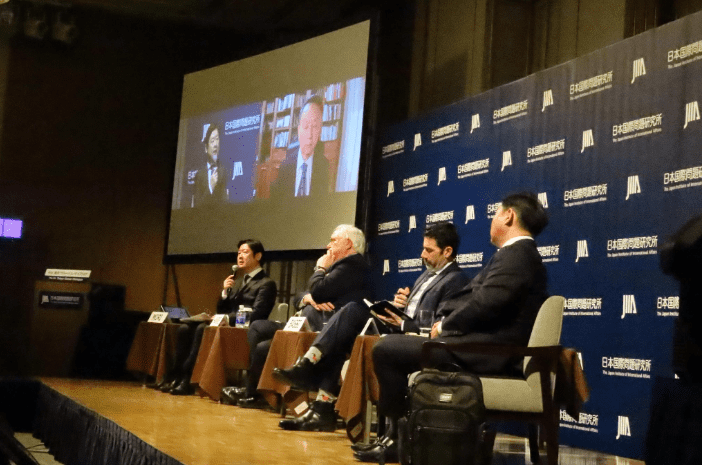
Test amid turmoil
Following the roundtable, Sasae gave welcoming remarks in which he mentioned that the wisdom of democracy and the international community is being tested in the midst of the global turmoil and that the role of the event is to spark debate in the world about pressing issues through the dialogue among the world’s leading experts.
That was followed by opening remarks delivered by Prime Minister Fumio Kishida, as is customary, and Foreign Minister Yoko Kamikawa presented a keynote address. Kishida said Japan has been contributing to international society as a peaceful state for the nearly 80 years since the end of World War II. “I am convinced that Japan can lead the world toward cooperation, not division and confrontation,” he said, and to achieve that goal it is essential to strengthen relations with the U.S., Japan’s primary ally. He also noted that Japan will enhance its partnerships with countries beyond the G7, including countries in the Global South, based on the rule of law and human dignity. He concluded by expressing his expectation that the discussions in the Tokyo Global Dialogue will lead the way to overcoming the upheaval in international society.
In her keynote address, Kamikawa mentioned three major issues that diplomacy needs to tackle to bring stability to the world: “First, how to maintain and strengthen the free and open international order based on the rule of law. Second, how to manage the intensifying competition between nations and defend peace. Third, how to protect individuals and human dignity — especially of vulnerable people, including women and children — from the effects of conflict and global challenges.” She explained in detail how these issues need to be addressed and Japan’s role in it all. She emphasized Japan’s refusal to accept any unilateral attempt to change the status quo by force.
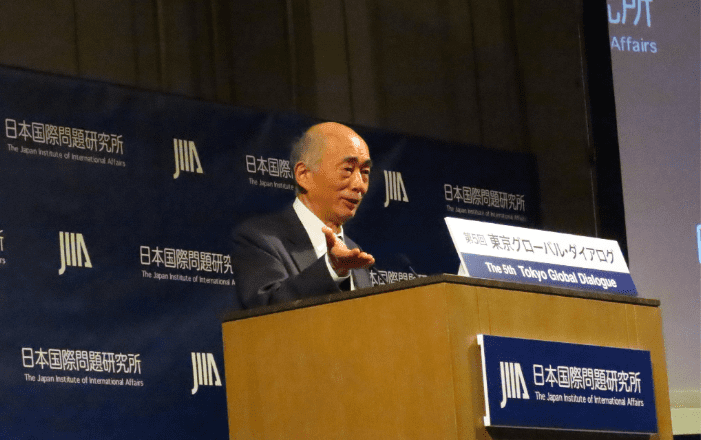
Politics, economics, security
Six sessions were held on the second day, engaging both the first day’s speakers and others from across the world. In Part 1, “U.S.-China competition and the Indo-Pacific,” two sessions were conducted: one about politics and security, and another about economic security. The two sessions in Part 2 focused on changes in the security environment and Japan’s responses from the perspective of its national security strategy and future challenges as well as the perspectives of territory, sovereignty and the rule of law. And finally, Part 3 dealt with the issues of Ukraine and the Middle East under the theme, “The advent of an era of perennial conflict and the future of international security and cooperation.” The first session focused on how to deal with the three fronts of Ukraine, the Middle East and Asia, and the second focused on the future of international security and cooperation.
In the closing remarks, Sasae touched on some important points that had been discussed in the six sessions, including the panelists’ consensus that the war in Ukraine is not a regional issue but a threat to the entire democratic camp; their concern over China’s actions on many issues; the importance of the unity of the international community in supporting a two-state solution for Israel and Palestine; and the need to stay calm but watchful as the U.S. heads into the presidential election, keeping in mind that rifts and confusion among America’s allies and friends can only benefit its enemies.
Sasae spoke of the complex issues that the global community faces and the report discusses, and ended on a positive note: “I believe that today’s discussion was dominated by a ‘cautious optimism’ that recognized the need to not overreact but instead overcome serious circumstances through the wisdom of the democratic countries.”

